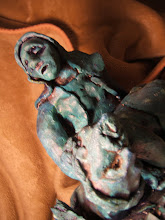As we today celebrate the testimonies Sts. Peter and Paul, I offer three questions posed by the Lord to St. Peter as points of entry for reflection as we each discern God's call for our lives. Invite you to ponder and chew over these questions.
1. What are you looking for? (John 1:38)
What is it that your heart is seeking?
Where is it seeking it?
What is the cry of my heart?
Jesus said, "Where your treasure is, there your heart will also be." (Matt 6:21)
2. Who do you say that I am? (Matthew 16:15)
Who is Jesus to you?
What aspects of his mystery have you encountered in your life?
Jesus said, "Whoever knows and obeys my commandments is the person who loves me. Those who love me will have my Father's love, and I, too, will love them and show myself to them." (John 14:21)
3. Do you love me more than these? (John 21:15)
What would 'these' be for you?
Would you be able to renounce them for the sake of Jesus?
Jesus said, "If anyone wishes to come after me, he must deny himself and take up his cross daily and follow me. For whoever wishes to save his life will lose it, but whoever loses his life for my sake will save it. What profit is there for one to gain the whole world yet lose or forfeit himself?" (Luke 9:23-25)
I believe these three questions are key to our discernment because a) it gets us in touch with the dynamics of our own hearts and b) it allows us to see where that heart stands in relation to the Lord.
As these questions are posed to us again in light of our discernment, it is important that we remember two things:
1) IT IS GRACE THAT SAVES US
Jesus builds his Church on the weak rock that is Peter. What I most appreciate about him is precisely his weakness. Every time Peter opens his mouth, he puts his foot in it. "He walks on the water – but then panics and starts to sink. He makes the first profession of faith – and moments later blunders into error and is called Satan by the Lord. He refuses to be washed, and then, when the purpose is explained to him, demands to be washed all over. And, of course, he betrays his master soon after having been warned that he will and having sworn not to. If Peter is the rock on which the Church is built, what a fissured and friable rock it is!...
In the end, it was grace that gave the coward the courage to bear witness when it counted, grace that gave the fool the wisdom he needed to set the infant Church on her way, grace that taught the impetuous man patience and forbearance."
No practice of virtue, however hard we may try, will ever give us that strength to overcome this humanity so deeply held by sin, evil and death. If ever we accomplish anything, it is the grace of the Lord at work precisely in our weakness.
Peter and Paul well understood this: "My grace is sufficient for you, for my power is made perfect in weakness." Therefore I will boast all the more gladly about my weaknesses, so that Christ's power may rest on me. (2 Cor 12:10-11) I hope in our journey of discernment that we too learn well this lesson.
2) PRAY PRAY PRAY
Discernment begins on our knees, in silent prayer before the Lord, because like Peter, our vocation emerges from our encounter with Jesus Christ, the Way, the Truth and the Life. Prayer reminds us that this is not our work, that we are but servants in the Lord's vineyard. In the white heat of Archbishop Romero words,
The kingdom is not only beyond our efforts, it is even beyond our vision. We accomplish in our lifetime only a tiny fraction of the magnificent enterprise that is God's work. Nothing we do is complete, which is another way of saying that the kingdom always lies beyond us. No statement says all that could be said. No prayer fully expresses our faith. No confession brings perfection, no pastoral visit brings wholeness. No program accomplishes the church's mission. No set of goals and objectives includes everything.
This is what we are about: We plant seeds that one day will grow. We water seeds already planted, knowing that they hold future promise. We lay foundations that will need further development. We provide yeast that produces effects far beyond our capability.
We cannot do everything, and there is a sense of liberation in realizing that. This enables us to do something, and to do it very well. It may be incomplete, but it is a beginning, a step along the way, an opportunity for the Lord's grace to enter and do the rest.
We may never see the end results, but that is the difference between the master builder and the worker. We are workers, not master builders; ministers, not messiahs. We are prophets of a future not our own. Amen.
Sts. Peter and Paul nourished the early Church with their blood. Through their intercession, may our own lives be poured out as a libation to the Lord so we can say with St. Paul: "I have fought the good fight, I have finished the race, I have kept the faith. From now on there is reserved for me the crown of righteousness, which the Lord, the righteous judge, will give to me on that day, and not only to me but also to all who have longed for his appearing.” (2 Timothy 4:6-8)
Oremus pro invicem.
Let us also pray for one another as we each discern God's call for our lives.
Subscribe to:
Post Comments (Atom)

No comments:
Post a Comment